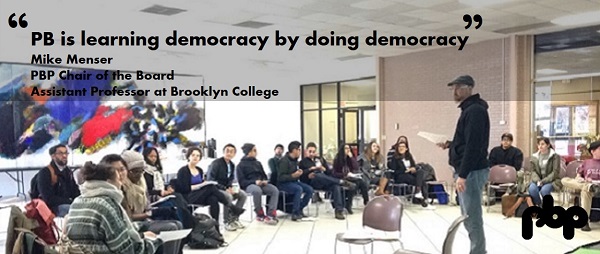We encourage our NCDD member organizations to register to join us for a special Confab Call on Wednesday, September 21st from 12-1pm Eastern / 9-10am Pacific that can help your organization build capacity while helping the emerging student leaders of our field gain skills and experience in D&D work!
NCDD is hosting an exciting presentation and discussion with the McCourtney Institute for Democracy, who will be sharing about the incredible opportunity for organizations to host a D&D-trained student fellow at no cost next summer through their Nevins Democracy Leaders Program! You won’t want to miss it!
This is a rare and competitive opportunity for leading organizations in our field, and this Confab Call will be one of the best ways to find out more about how your group can take advantage of this program, so make sure to register today to save your spot on the call!
The Nevins Democracy Leaders Program was founded in 2014 after a gift from David Nevins, an NCDD Sustaining Member. The program provides Penn State students with education and training in transpartisan leadership skills by exposing them to a variety of viewpoints and philosophies, as well as teaching critical thinking along with the tools of dialogue and deliberation.
But the flagship work of fostering the next generation of democracy leaders centers on the yearly initiative to place Nevins Program students in unique fellowship position with organizations focused on D&D, transpartisan dialogue, and civic renewal – that means organizations like yours! Stipends and living expenses are provided to the students through the program so that organizations can bring these bright, motivated students into their work for a summer at no cost to them. It’s an amazing opportunity for everyone involved! You can get a better sense of what the program experience is like by checking out this blog post from a 2016 Nevins Fellow about their summer fellowship with the Close-Up Foundation.
NCDD is proud to have partnered last year with the McCourtney Institute to help identify organizations in the field that can host Nevins fellows, and we’re continuing the partnership this year. This Confab Call is the best way to get your organization plugged into the process, so be sure to register today to learn more about the program and how to apply!
On this Confab, McCourtney’s Senior Scholar John Gastil and Managing Director Christopher Beem will provide an overview of the Nevins program and its aims, discuss the training that the future fellows are going through, and share more about how your organization can take advantage of this great chance to help cultivate the next generation of D&D leaders while getting more support for your work – all for FREE! We can’t wait to talk more with you on the call!
About NCDD’s Confab Calls…
 NCDD’s Confab Calls are opportunities for members (and potential members) of NCDD to talk with and hear from innovators in our field about the work they’re doing, and to connect with fellow members around shared interests. Membership in NCDD is encouraged but not required for participation. Register today if you’d like to join us.
NCDD’s Confab Calls are opportunities for members (and potential members) of NCDD to talk with and hear from innovators in our field about the work they’re doing, and to connect with fellow members around shared interests. Membership in NCDD is encouraged but not required for participation. Register today if you’d like to join us.











